In November 2018, Attorney General Gurbir Grewal issued the “Immigrant Trust Directive,” a landmark statewide policy designed to strengthen trust between New Jersey’s law enforcement officers and the state’s diverse immigrant communities. The Directive ensures that victims and witnesses feel safe reporting crimes to local police without fear of deportation.
The Directive is based on a simple premise: to build trust, we must draw a clear distinction between state, county, and local law enforcement, who are responsible for enforcing state criminal law, and federal immigration authorities, including ICE, who enforce federal civil immigration law. The Directive limits the types of voluntary assistance that New Jersey’s 36,000 law enforcement officers may provide to federal immigration authorities and applies to state and local police officers, correctional officers working in state prisons and county jails, and state and county prosecutors.
Why the Directive Matters
Every day, New Jersey law enforcement officers work hard and earn the trust of the communities they serve. But actions in Washington have made it more difficult for them to do their job.
Over the past two years, the federal government has done everything it can to make this country unwelcoming to immigrants. The federal government has cultivated a culture a fear—a fear that drives some of our most vulnerable residents deep into the shadows. These residents fear that a traffic stop will place them in a detention center, and so they avoid they day-to-day tasks that the rest of us take for granted. They fear that a call to police will end in their deportation, and so they don’t say anything when they are the victim of violence of fraud.
Crimes go unreported. Criminals remain on the street. Justice goes unserved. This affects the safety of all New Jersey residents.
Part of the problem is that some of New Jersey’s most vulnerable residents—especially those who recently arrived in this country—do not always appreciate difference between an ICE officer and local cop. They simply fear anyone with a badge. In an era of heightened concern, the only practical solution is to draw a bright, clear line between local police and federal immigration authorities.
The Immigrant Trust Directive makes that distinction clear. Under the Directive, New Jersey police officers cannot participate in federal immigration raids. They cannot stop, question, arrest, search, or detain an individual based solely on actual or suspected immigration status. And they cannot ask an individual’s immigration statute except in rare cases when it is relevant to a specific criminal investigation.
The Directive sends a clear message to Washington: we will not allow you to drive a wedge between New Jersey’s law enforcement officers and our immigrant communities. And we will not allow federal authorities to stop us from ensuring the safety of all nine million New Jersey residents.
Separating Fact from Fiction
Some people have mischaracterized the Immigrant Trust Directive. And while the Directive does change some aspects of state law enforcement practices, it is important to understand what the state is not changing.
Nothing in the Directive restricts officers from complying with federal law. Nothing prevents officers from enforcing valid court orders, including warrants signed by state or federal judges. And nothing provides “sanctuary” to those who commit crimes in New Jersey. If you break the law – if you assault someone, if you rob someone, if you defraud someone – you will still go to jail, no matter your immigration status. In February 2020, the U.S. Department of Justice filed a lawsuit seeking to terminate aspects of the Directive, joining two New Jersey counties that had filed similar suits several months earlier. At the same time, some political figures have used inflammatory language to describe the Directive, creating confusion about how the policy works and why it matters to the residents of New Jersey.
It’s important to separate fact from fiction. Below are the legal papers filed by the State of New Jersey defending the Directive, as well as other sources of information that clarify the Directive’s purpose.
- Motion to Dismiss
- Reply in Support of Motion to Dismiss
- Opposition to Cape May Motion for Preliminary Injunction
- Declaration from Michael A. Gaimari Supporting Preliminary Injunction Opposition
- Declaration from Angelo J. Onofri Supporting Preliminary Injunction Opposition
Understanding the Directive
We’re committed to making sure that all New Jersey residents under the Directive. That’s why we recorded short videos in nine languages—all with the help of New Jersey police officers who grew up speaking a different language at home.




